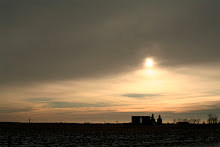We are targeting primarily noxious weeds along with some other troublesome weeds not yet considered noxious in all states. The biggest targets are thistle (primarily Musk Thistle), marestail, bindweed, and Johnsongrass. Except for the Johnsongrass all the weeds listed are broadleafs, the same category as corn and soybeans. Unfortunately the only way to get rid of the Johnsongrass is to add glyphosate to the chemical mixture which means all grass will be seriously burned or killed.
The part of Kansas we are in is rife with corn and soybeans (remember, I mentioned them above for a reason), all grown close to the railroad right-of-way. Now factor in a little bit of wind and you can see the potential for disaster. And when is it not windy in Kansas? This is where the job gets stressful.
The weed agent for Butler County takes his job very seriously. He sees it as his personal mission in life to rid the county of every noxious weed sprouting in it. One of the worst places tends to be railroad right-of-ways, so you can guess who he is always on, us! If we don't do a good job of killing every strand of Johnsongrass and Musk Thistle in his county, who is he going to go after with fines? So the pressure is on to get as much as possible in the ROW, at the same time this increases the chance for drift into nearby cash crop fields. So what do you do? Try and kill the weeds regardless and have claims for 100 miles up and down the railroad or reduce drift and face the wrath of the Weed Agent?
And what about just making a mistake, like turning on the wrong spray nozzle at the wrong time, or moving the boom in the wrong direction. A whole section of a soybean field can be eradicated by a wrong move. And what about those people's gardens in the small towns along the way? It seems like if a tomato plant even gets a whiff of chemical it's dead.
In addition the railroad is full of signs, signals, switch stands, crossing posts, and hundreds of other obstacles. It takes constant vigilance and concentration to get around all of these things and get the acres sprayed. This is where there's huge room for mistakes. Lifting up over a sign at the same time a gust of wind comes up can be bad. But you still have to get around all of the objects and spray the weeds.
For all of the federal regulations, state regulations, railroad rules, and angry farmers there are a lot of days this job just doesn't pay enough for the stress (and I'm not even a crew leader, they have it even worse!). This isn't even going into all the federal regulations regarding pesticides, especially restricted use pesticides. If you make a mistake in measuring chemical into a mixture and someone found out, say goodbye to your applicator's license and two months worth of pay. And don't even think about not triple-rinsing used chemical containers, there goes another month of pay.
Don't you wish you were a commercial applicator?

1 comment:
oh yes. i want this job. definitely...
Post a Comment